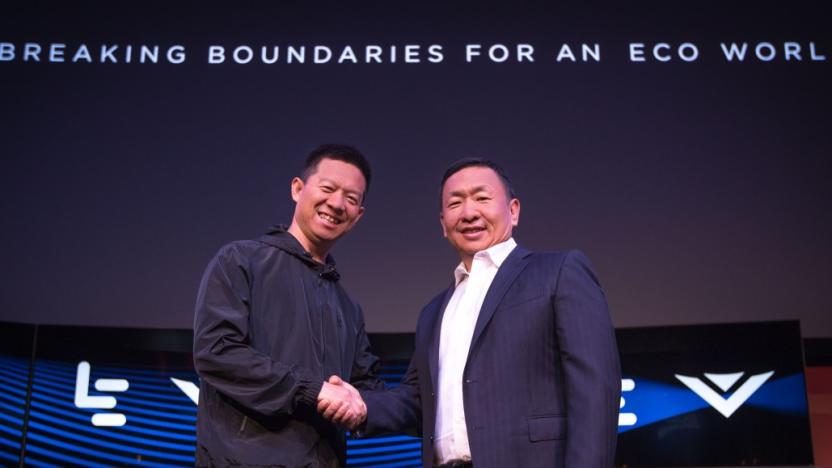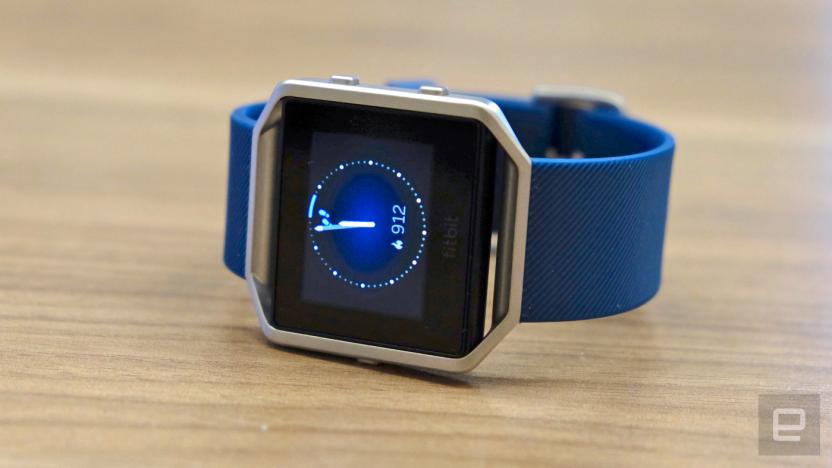purchase
Latest

Amazon’s ready to own the future of grocery shopping
"When I look at the menu," Jeff Bezos allegedly said, "you're the thing I don't understand, the thing I've never had." He was explaining to Matt Rutledge, founder of Woot, why Amazon had bought his online anti-retailer for $110 million. Bezos justified the purchase of the site the same way he'd ordered octopus for breakfast in a famous meeting, as described by D Magazine. Rutledge understood the point: If Amazon doesn't understand something, it will use its financial clout to buy it and dissect it in search of its je ne sais quoi.

Fitbit just bought another smartwatch startup
One of the more surprising smartwatches of 2015 was from Vector, a Romanian startup led by former Citizen executives. Its 30-day battery life, Pebble-esque UI and classic watch design made it a great device for someone seeking a less ostentatiously geeky wearable. Now, the company has revealed that Fitbit has purchased its assets, and its employees will be joining the fitness wearables firm.

China's LeEco buys Vizio in a $2 billion deal
Today at an event in Los Angeles, Vizio announced that it will sell to China's LeEco (formerly LeTV) for $2 billion. Don't expect to see much change on store shelves, as the company plans to continue operating under the Vizio name as a wholly-owned subsidiary. The exception to this is its viewer data business Inscape -- we learned about it last year when Vizio filed plans for a now-unnecessary IPO -- which will spin off and operate as a separate privately-owned company controlled by Vizio founder William Wang. Wang will own 51 percent of Inscape, with the rest going to LeEco attached to a 10 year license for the technology, which monitors what people are actually watching on their TV to help with things like targeted advertising.

Fitbit buys Coin to help with mobile payments
Fitbit is purchasing (almost all of) Coin, the payments startup that developed a universal credit card replacement. The world's biggest maker of wearable technology can now leverage Coin's know-how and integrate NFC-based commerce to its hardware. Fitbit has already said that there are "no plans" to integrate Coin's setup into the products it'll launch in 2016, so you can be damn sure it'll be there for 2017. It's not going to be a big leap for either party, as Coin was working on some form of payments watch earlier this year. At the time, it had signed up Atlas Wearables, Omate and Moov, as well as MasterCard to handle the processing.

Nokia will buy Withings for $191 million
Nokia has announced that it's going to buy Withings for €170 million ($191 million). The French health and wearables company will become a division of Nokia Technologies, home to the Ozo Camera and N1 Tablet. It's another step towards Nokia's re-emergence as a consumer brand after Microsoft bought its phone division in 2013. In a statement, Nokia's Ramzi Haidamus said that his company is now uniquely positioned "to lead the next wave of innovation in digital health." Withings CEO Cedric Hutchings agrees, saying that he was "excited to join Nokia to help bring our vision of connected health to more people around the world."

Logitech buys Jaybird for $50 million
If you already make killer audio products, do you think spending $50 million on a headphone firm is a good idea? It is you're Logitech's management, which just cut a check for that amount to buy sports audio outfit Jaybird. Much like Ultimate Ears, Jaybird will remain an independent subsidiary of its new parent company, selling wireless sport buds. Logitech's interest may rest more on Jaybird's sport-focused wearable, Reign, which measures your heart rate variability during training. In a release, Jaybird founder Judd Armstrong says that his firm will "benefit from Logitech's global distribution network and engineering prowess."

Ticketmaster will start selling tickets on Facebook this month
You can already buy things on Facebook, and later this month, you'll be able to snag concert tickets without leaving the site, too. Ticketmaster VP Dan Armstrong told BuzzFeed in an interview that the ticket retailer would begin selling admission to live music and other events through the social network's site and mobile app before April's end. While Ticketmaster isn't the first to coordinate purchases from Facebook, making tickets to events available on the social channel seems like a good move for both companies.

Activision buys 'Candy Crush' developer King for $5.9 billion
Say what you will about the quality of Activision's output, but the company makes incredibly smart business moves. Like the announcement that it purchased Candy Crush studio King Digital Entertainment for a cool $5.9 billion. For comparison's sake, Amazon paid a paltry $970 million for Twitch while Facebook spent $2 billion on Oculus VR and $19 billion on messaging platform Whatsapp. Oh, and Minecraft only set Microsoft back $2.5 billion. Bobby Kotick and Co. definitely think this is a big deal, and considering just how many people play the mindless puzzler this is likely a smart investment.

Apple buys an AI startup with eye on better photo management
Apple's acquired a startup with a keen focus on developing artificial intelligence systems that run locally on your device rather than at an offsite server farm. In Perceptio's case (why does every start-up sound like Aviato now?), it's using deep learning for photo classification rather than other mundane tasks, according to both Bloomberg and ReCode. The latter notes that Facebook and the like do this with cloud processing but Apple is incredibly big on not storing user-data offsite. So it makes sense that the company would be interested in bringing this sort of imaging tech to its handsets and computers -- especially considering that new camera the iPhone 6s series is sporting.

Yahoo's latest purchase is digital fashion community Polyvore
Marissa Mayer opened up the Yahoo warchest once again, and this time it was to buy the "leading social shopping site," Polyvore. Yahoo's purchasing the whole kit and caboodle from the sounds of it too with Mayer writing on her Tumblr page that it's acquiring not just the service, but the team that built it as well. She says the purchase will work to bolster Yahoo's digital content growth and that current CEO Jess Lee (apparently a Polyvore community member prior to joining the company proper) will report directly to her. And if you're a current Polyvore enthusiast yourself, it doesn't sound like too much should change aside from where current employees report for work -- we'll let you know if those turn out to be offices for ants. [Image credit: Pink Cow Photography/Flickr]

Intel buys Recon, makers of the 'Google Glass for fitness'
Recon Instruments is famous for two things: building the technology behind Oakley's Airwave and the Recon Jet head-worn fitness wearable. The company has had a close relationship with Intel ever since the chip firm's venture-capital arm threw cash at the business back in 2013. Now, however, Intel has decided that closer ties are in order, and has decided to swallow the Canadian firm wholesale in a deal that TechVibes believes is worth around $175 million.

Investment bank 'confirms' Razer quietly bought OUYA
One of the problems with keeping the news of a recent engagement a secret is that, sometimes, an investment banker runs off and tells your parents before you can. That's the sticky situation that has met Razer and Ouya, since their recent union has been revealed by the latter's advisors at Mesa Global. The news comes a week after the first rumors that corporate wedding bells were in the air, which was met with a non-denial from the high-end gaming company. There's no word on the specifics of the deal, but like an angry relative, we've sent Facebook messages to representatives of both companies in the hope of getting a picture of the ring. Still, if Razer CEO Min-Liang Tan had any big announcements ready for E3, they probably just got ruined. Bankers, eh?

Verizon is buying AOL for $4.4 billion
AOL, Engadget's parent company, has just been acquired by Verizon for $4.4 billion, or around $50 a share. The carrier believes that a tie-in between the two businesses will boost Big Red's online video and content strategy. AOL itself, far from just being the name on all those discarded dial-up internet CDs, is also a player in the online ad business -- and has developed several behind-the-scenes products for marketers.

Jay Z's bid to buy a Spotify competitor is back on (update: done!)
You might be expecting a riff on one of Jay Z's lyrics to preface the news that stockholders have apparently approved Hova's bid for music-streaming outfit Aspiro. Sorry, it's not happening; instead, the excellent photo above will just have to suffice. Anyhow, with today's looming deadline to make a decision, Swedish news outlet E24 reports that Aspiro's minority shareholders have decided it was best to accept the 464 million Krona (roughly $56 million) bid from S. Carter Enterprises' "Project Panther." Next up? Most likely, an official announcement from both parties and then something from a governing trade body saying that the sale's been approved. If you need something to do until then, you could always dig an old Samsung phone out of the drawer, fire up the Magna Carta app and remind yourself of Jay's last streaming move. Update (3/13): Jay Z's Project Panther Bidco announced today that it acquired enough shares to take over Aspiro. [Image credit: Getty Images]

Pre-orders for Marvel Heroes' Winter Soldier are now open
After years of being mostly notable for being supposedly dead, Bucky Barnes turns out to have actually been kept alive as an elite assassin known as the Winter Soldier. You know, as comics do. The important things to note about the character for our purposes are the fact that he's coming to Marvel Heroes and you can pre-order him right now. You can also hear David Hayter voicing him as a closely related cousin of Solid Snake in the video past the cut, but that probably shouldn't influence your purchase. The hero pack is at a 10% discount before the character is released and includes the character himself, two costumes for Bucky (comic and MCU incarnations), an extra hero-specific inventory, six Fortune cards, and a retcon token. With the discount, it's just a hair over $16; if that sounds like a bargain for playing a mildly psychotic unfrozen Hydra assassin, you can pick it up now.

Why did Tinder just buy a photo-messaging app?
Strangely, for an app that's all about appearances, Tinder has never allowed its users to directly send images to one another. That could be set to change, however, as the dating startup has announced its first-ever acquisition: Tappy, a Snapchat-like app. Tappy launched last summer as a high-concept ephemeral messaging app. To start a conversation in the app, users had to send an image, which would disappear after 24 hours. The idea was that photos would spark conversations, but despite positive reviews, the app never really took off.

Oculus is buying a company that brings hands into virtual reality
Right now, the term "virtual reality" still means "headset" for most people. What we should really think when we read "virtual reality" is first-person immersion. The headset -- like Oculus VR's Rift, Sony's Project Morpheus, and Samsung's Gear VR -- is simply the first tool for creating that sense of immersion or "presence." But once you're in a headset, the first things you do are the undoable: reach out with your physical hands into virtual reality. It's not exactly surprising, then, that Oculus VR would acquire Nimble VR -- the company behind Nimble Sense, a camera and software combo that brings the world around you into virtual reality. Think of it like Kinect: cameras that are able to track your skeletal movement and create a point cloud around you, which then translate that data into a virtual representation on-the-fly.Still confused? We've got a video hands-on of Nimble VR's Sense camera from early November below the break, used in-tandem with Oculus VR's second Rift development kit (pictured above).

Nordic acquires adventure games from Awesomenauts publisher
Nordic Games continued its spending spree today, picking up a few properties from Awesomenauts publisher DTP Entertainment. Nordic purchased three intellectual properties from the German publisher: The Moment of Silence (seen above), The Mystery of the Druids and Curse of the Ghost Ship. DTP also agreed to hand over commercial use of Overclocked and 15 Days to Nordic Games. Each of the five properties listed in the purchase agreement were developed by House of Tales, a Bremen, Germany-based PC adventure game developer. Nordic said its adventure games division, The Adventure Company, "gets a considerable increase" thanks to the IP acquisition, adding that it "will make good use of these new opportunities." The publisher completed its purchase of the de Blob series from THQ last month, over a year and a half after the Austrian company bought dozens of other THQ properties such as Darksiders, Red Faction and MX vs. ATV for $4.9 million. [Image: DTP Entertainment, err, Nordic Games]

Microsoft completes acquisition of Minecraft studio
Microsoft has successfully acquired Minecraft developer Mojang, completing a $2.5 billion purchase announced in September. Minecraft earned a reported $326 million in revenue in 2013 across game sales, ports and merchandising. Minecraft creator and Mojang co-founder Markus "Notch" Persson has since departed the company, expressing a desire to "go back to doing Ludum Dares and small web experiments." Microsoft retained close ties with Mojang following the launch of the million-selling Minecraft: Xbox 360 Edition in 2012, and followed up with a recent Xbox One port. For more insight regarding Mojang's acquisition, check out our comprehensive timeline of events leading up to the purchase. [Image: Microsoft]

Nordic officially purchases de Blob series from THQ
Over a year and a half after it won dozens of intellectual properties in THQ's back catalog auction, Nordic Games announced that it closed an asset purchase agreement with THQ for de Blob today. With the rights to the series now officially owned by Nordic Games, de Blob joins properties such as Darksiders, Red Faction and MX vs. ATV on the Austrian company's list of games. The publisher acquired those brands in April 2013 for $4.9 million. "We are excited about what the future holds for this polychromatic extravaganza as the newest addition to our portfolio," Business and Product Development Director Reinhard Pollice said in an update on the publisher's site. "We will evaluate opportunities with the existing games, as well as potential sequels." De Blob launched in 2006 on PC before a THQ-published Wii version arrived in 2008. The paint-splattering, platforming follow-up de Blob 2 launched on Xbox 360, PS3 and Wii in 2011. Nordic Games also reportedly acquired the THQ trademark under a separate agreement revealed in June, though the mark's listing on the USPTO's website still notes THQ as its owner. [Image: THQ, err, Nordic Games]








